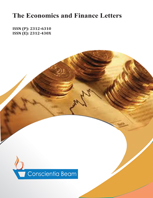Money Supply & Growth Nexus: Evidence from Nigeria
DOI:
https://doi.org/10.18488/journal.29.2021.82.117.129Abstract
The study focused on the dynamic impact of the broader money supply (M3) on economic growth (proxied by Purchasing Manager Index) in Nigeria between 2010M1 and 2018M12. The study investigated the long and the short-run relationship between the selected macroeconomics variables including broad money supply (M3); consumer price Index (CPI); Oil price (OIL), external reserves (Rev) and economic growth using, the Autoregressive Distributed lag (ARDL) method. The findings from the study indicate that in the long-run, the relationship between the broad money supply and economic growth is not only significant statistically but also positive in compliance with theory. The error correction coefficient -0.38072 is statistically different from zero and negative in line with a priori expectation. The result shows that deviation from equilibrium between economic growth as proxied by PMI and other predictors is recovered at an average speed of about 38% monthly in the long-term. The implication here is that the Central Bank of Nigeria is encouraged to maintain a steady rate in the growth of its monetary aggregates, in such a way that is consistent with economic growth. This, of course, is to serve as a complementary policy measure to government’s Economic Recovery and Growth Plan (ERGP).

